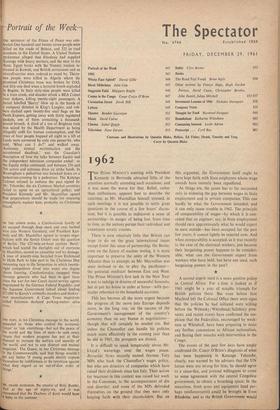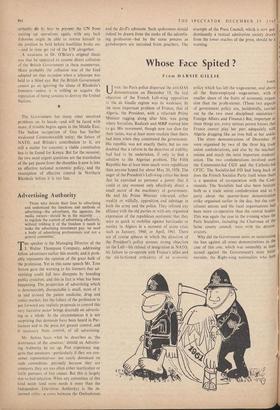1 9 6 2 MHE Prime Minister's meeting with President
1 Kennedy in Bermuda attracted little of the attention normally attending such occasions; and it was none the worse for that. Relief, rather than enthusiasm, appears best to describe the outcome; as Mr. Macmillan himself stressed, in such meetings it is not possible to settle great questions in the course of a few hours' discus- sion; but it is possible to rediscover a sense of partnership—in danger of being lost, from time to time, as the nations pursue their individual and sometimes erratic courses.
There is now relatively little that Britain can hope to do on the great international issues except foster this sense of partnership. On Berlin, even on the future of nuclear testing, it is more important to preserve the unity of the Western Alliance than to attempt, as Mr. Macmillan was once inclined to do, to play the pacificator— the potential mediator between East and West. The Prime Minister's first task in the New Year is not to indulge in dreams of successful Summits, but to put his house in order at home—with par- ticular reference to the household accounts.
This has become all the more urgent because the progress of the move into Europe depends more, in the long run, on the success of the Government's management of the country's economy than on any finesse in negotiations— though that will certainly be needed too. But unless the Chancellor can handle his policies much more effectively in the coming year than he did in 1961, the prospects are dismal.
It is difficult to speak 'temperately about Mr. Lloyd's waverings over the wages pause. Reynolds News recently named thirteen Tory MPs who back the Chancellor's wages policy, but who are directors of companies which have raised their dividends since last July. Their action (or inaction) in this context was raised last week in the Commons, to the accompaniment of din and disorder; and some of the MPs defended themselves on the ground that they were only keeping faith with their shareholders. But on this argument, the Government itself ought to have kept faith with State employees whose wage awards have recently been repudiated.
As things are, the pause has so far succeeded only in widening the gap between wages in State employment and in private companies. This can hardly be what the Government intended; and it can only cause trouble in 1962. The principle of comparability of wages—by which it is con- ceded that an engineer, say, in State employment should earn approximately what he would expect to earn outside—has been accepted for the past few years; it cannot lightly be rejected now. And when comparability is accepted, as it was recently in the case of the electrical workers; just because their bargaining power happens to be consider- able, what can the Government expect from workers who have held, but have not used, such bargaining powers in the past?
A second urgent need is a more positive policy in Central Africa. For a time it looked as if 1961 might be a year of notable triumph for British policies there. But even before fain Macleod left the Colonial Office there were signs that the policies he had initiated were wilting before the Welensky /Whitehead/Salisbury pres- sures; and recent events have confirmed the sus- picion that the Federalists, encouraged by weak- ness at Whitehall, have been preparing to resist any further concessions to African nationalism, and flexing their muscles with intervention in the Congo.
The events of the past few days have amply confirmed Dr. Conor O'Brien's diagnosis of what has been happening in Katanga. Tshombe, clearly, was warned by his advisers that the UN forces were too strong for him; he should agree to a cease-fire, and pretend willingness to come to some agreement with the central Congolese government, to obtain a breathing space. In the meantime, fresh arms and equipment (and per- haps reinforcements) could be brought in from Rhodesia; and as the British Government would certainly do its best to prevent the UN from starting up operations again, with any luck Tshombe might be able to restore himself to the position he held before hostilities broke out —and in time get rid of the UN altogether.
A weakness in Dr. O'Brien's • original thesis was that he appeared to assume direct collusion of the British Government in these manoeuvres. More probably the collusion was of the kind adopted on that occasion when a telescope was held to a blind eye. But the British Government cannot go on ignoring the abuse of Rhodesia's frontiers—unless it is • willing' to acquire the reputation of being anxious to destroy the United Nations.
The Government has many other unsolved problems on its hands—and will be faced with more, if trouble begins again in the Middle East. The Indian occupation of Goa has further weakened Commonwealth unity; the future of NATO, and Britain's contribution to it, are still a matter for concern; a viable constitution has to be found for Kenya. But for the moment, the two most urgent questions are the translation of the pay pause from the shambles it now is into an effective national economic policy, and the resumption of effective control in Northern Rhodesia before it is too late.



























 Previous page
Previous page